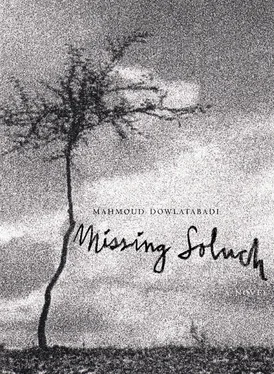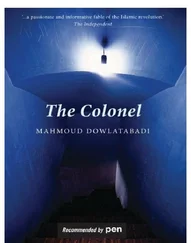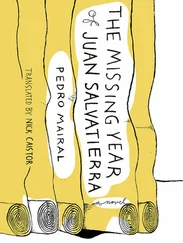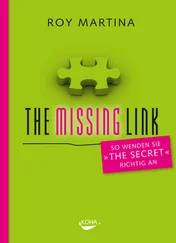* * *
She went home.
“Auntie Mergan! Tomorrow night there will be a mourning ceremony at Zabihollah’s house. He’s asked for you to come and make the arrangements.”
“This is from the Sardar. He says it’s Abbas’ pay!”
Tired and sweaty, Abrau tossed the shovel to one side, lowered a sack of flour from his shoulder, and leaned against the wall. Then he beat his hands together and shook the flour out of the sleeves of his shirt. Mergan sat, silent and shocked. She looked at the shovel that she had left behind at the Sardar’s house. She kept staring at it. Abrau sat on the ground and said, “He told me he’d set the flour aside for a whole month for you to come and pick up. Why didn’t you go earlier?”
Mergan said, “I was busy. Anyway, I thought I’d go and get it closer to the winter, when we really need it.”
From the corner, Karbalai Doshanbeh said, “Good for the Sardar! Good for him! It seems he’s become fair in his accounts. It used to be that it caused him pain anytime one of his herders came to ask for his wages. Well, God bless him! He’s finally become a man!”
Abrau had become more conscious of Karbalai Doshanbeh; a moment before, as he was lowering the bag of flour, he saw him but did not want to display any reaction. But now he had no choice but to look at him. He was sitting, as always, straight against the wall in the spot he always sat in, with his head lowered. When he was quiet, it was possible to forget he was there at all. He would still be there, but quiet and introspective, a heavy presence. He would sit against the wall, his elbows on his knees, with his hands busy fingering his worry beads. This man, this old man, did always have a kind of presence. But his silence was as if he were absent, and one could imagine that he could stay in his position against the wall for years, fingering his worry beads. He was short of words, but his words always had an impact, and now he was mocking the Sardar. It was of no real importance to him that the Sardar had sent a bag of flour to Mergan. Anything the Sardar did gave him a pretext for a clash, and so he would invariably attack. Whatever the cause, he would attack. But Karbalai Doshanbeh didn’t attack anyone in particular. He had the temperament of a scorpion and walked like a tarantula, with his bowed short legs and his long and crooked arms. His shoes were torn. His scarf was oversized and stained. His pants were too short, and when he walked, his overcoat’s edges blew to and fro. When he began to laugh, whenever he had shown up someone, his cheeks would turn red and his eyes would fill with tears. He was an old man, and he looked like he’d seen both good and bad in his lifetime. He was proud of this, proud that he had lived in places far from the village, and also that he had spent time in prison.
But others who knew him well considered his experiences outside the village, and the episode of his imprisonment, as a point of disgrace for him. The story was that he had been wrongfully arrested in Eshghabad, and in fact on the day he was to have been released, someone else was mistakenly released in his place. The story was that the officials had mistaken Karbalai Doshanbeh for one of the affiliates of Khabir Khan, the famous profiteer and smuggler, and had arrested him. It was nearly a year before it came to light that he was not the person they had been seeking. When the wardens called his name in the prison to release him, by the time he heard them and reacted, another convict had quickly presented himself by that name and had been released. So Karbalai Doshanbeh remained in the Eshghabad prison until the day that they called someone else for release. The person they named wasn’t there, but the officials found Karbalai Doshanbeh lying in the far corner of the prison looking at them silently. Only then did they realize what had happened. They picked him up and dragged him out. One of the local officials slapped him on the back of the head, and then they threw him on the street.
This version of the story was told by Karbalai Doshanbeh’s old traveling companions and the people who went out in caravans with him, people like Molla Aman and the Sardar. But rarely did he tell his own side of the story from beginning to end. Mostly he’d make elusive comments about the experience, and if he discussed it, he would only speak in general terms. There were a few people who had heard him tell the entire tale, but they were very few in number.
Abrau had become used to seeing Karbalai Doshanbeh, as recently he had begun to come by their home more and more often. He would sit, drink tea, and mutter comments under his breath, occasionally saying a couple of words out loud. If lunch or breakfast was offered, he’d eat. Eventually he’d get up slowly and then just leave. He clearly had begun to see himself as part of their family, or as one of their closest friends. At times, he even would make a joke or lightly poke fun at something, just to have a laugh. Even if, in the end, he was the only person to laugh at the joke. In any case, Abrau saw that the old man’s feet were leading him to their home more and more often. He didn’t approve, but he had no choice but to just bear it quietly and not say anything. The main reason for this was that Karbalai Doshanbeh was Zabihollah’s uncle, and Zabihollah was a close partner of Mirza Hassan’s. Abrau was, at this point, significantly indebted to Mirza Hassan. The issue at hand was Abrau’s livelihood and his relationship with Mirza Hassan; all it would take would be for them to fire him from the job with the tractor and his life would be over. So Abrau felt he had no choice but to accept the indignities and not say anything. Abrau’s inability to say anything, and Abbas’ continued silence, not to mention Mergan’s confusion over what to do, all gave Karbalai Doshanbeh an arena to continue to make his advances unchallenged. All that was left was for him to go and put his bedding on his back, bring it over, and move into Mergan’s home permanently.
Let’s just see what will happen …
This was what Abrau told himself.
But what about Mergan? What was she thinking and feeling?
Mergan acted indifferently, as if she didn’t care if the world were washed away in a flood. When you’re caught inside a typhoon, you don’t worry if you’ve remembered to button up your collar or not. You don’t worry that dust is getting into your eyes. You’re in the middle of a typhoon; you can’t be worrying about whether or not your throat is dry. You’ve just endured a deep dishonor, and you’re going to get upset that Karbalai Doshanbeh is practically moving into your house? If he decides to, so what? Why worry about it? Let others say what they will. What can they say? Nothing. They can’t say anything. Mergan is the only person who can say something about this situation. Freeing yourself from others is actually quite easy. What is difficult, perhaps impossible, is to free yourself from yourself. That’s why Mergan was unable to find an answer for herself. It wasn’t out of a fear of what others might say. What worried her was not that the word would spread that Karbalai Doshanbeh had made himself comfortable in Mergan’s home. No, the looming disaster was that Mergan’s own confusion made it difficult to even consider her own feeling about what others were saying. The weight of Mergan’s thoughts, and the opinions of others about her, were so far from each other that she had somehow lost herself in between the two points. She was lost, rudderless. She kept hitting her head against her frustration, and she wished she could tear off the skin of lies clinging about her with a single scream.
Ah! You’re all wrong, fooling yourselves!! The only thing that’s true is what I am saying — this is the truth. Mergan, don’t wallow in lies either! Your heart is right here; see where it is. So why are you shooting arrows at a fantasy of your own making?
Читать дальше












